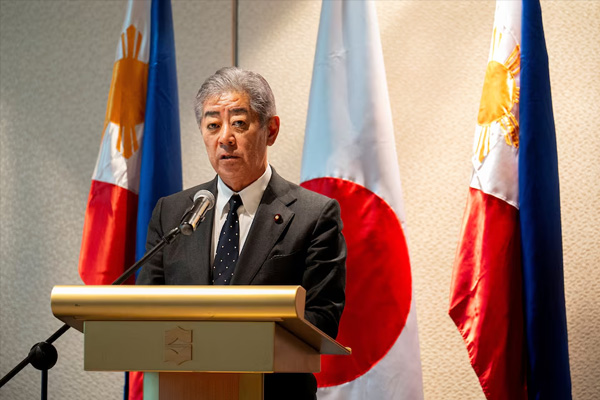Japan’s Foreign Minister said on Wednesday that the country is “gravely concerned” about actions in the South China Sea that are escalating maritime tensions, and strongly opposes any unilateral attempt to alter the status quo.
Speaking during a visit to the Philippines, Takeshi Iwaya also said Japan would continue to provide development and security assistance to Manila and support for its maritime security, adding a trilateral mechanism that also includes the United States would be strengthened when a new administration takes over in Washington.
Iwaya’s visit follows a virtual call between Japan’s Prime Minister Shigeru Ishiba, Philippine President Ferdinand Marcos Jr. and outgoing United States President Joe Biden where the three leaders affirmed their “trilateral arrangement” in deepening economic, security and technology cooperation in the face of growing maritime tensions in the region.
The transition to U.S. President-elect Donald Trump’s administration on Jan. 20 leaves Marcos as the only original leader out of those who established the trilateral initiative in 2024.
Philippines-Japan Maritime Concerns
Under Marcos, security engagements between the Philippines and Japan, two of the closest Asian allies of the U.S., have significantly deepened as both nations address shared maritime concerns over China’s increasingly assertive actions in the region.
“Japan strongly opposes any attempt to unilaterally change the status quo by force or build up tension in the region. We strongly ask for easing of tensions,” Iwaya told a joint press conference with his Philippine counterpart in Manila, without mentioning China.
China claims much of the South China Sea, a conduit for the bulk of northeast Asia’s trade with the rest of the world. Brunei, Malaysia, the Philippines, Taiwan and Vietnam also have claims on the waterway.
The Chinese embassy in Manila did not immediately respond to a request for comments on Iwaya’s remarks.
Japan, which announced in 2023 its biggest military build-up since World War Two in a step away from post-war pacifism, does not have any claims to the busy waterway. But it has a separate maritime dispute with China in the East China Sea, where the neighbours have repeatedly faced off.
Military Pact
Last year, Japan signed a landmark military pact with the Philippines allowing deployment of forces on each other’s soil. Manila also became one of the first recipients of Tokyo’s official security assistance, a programme aimed at helping boost the deterrence capabilities of its partner countries.
The Philippines has been embroiled in wrangles at sea with China in the past two years as the two countries face off regularly around disputed features in the South China Sea that fall inside Manila’s exclusive economic zone.
Both countries have accused each other of encroachment, while the Philippines has condemned Beijing over the presence and conduct of its coast guard fleet.
“I am gravely concerned that actions heightening tension in the South China Sea are repeated. The issue over the South China Sea is a legitimate concern for the international community,” Iwaya said.
Philippine Foreign Minister Enrique Manalo said his country’s relationship with Tokyo was among the most resilient and dynamic in the region.
The two ministers discussed the security situation in the East and South China Seas and their work together amid an evolving geopolitical landscape, he said, adding the two remain committed to a regional rules-based order.
(With inputs from Reuters)
















